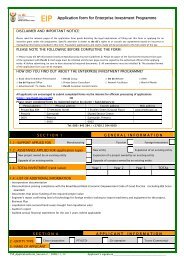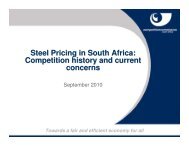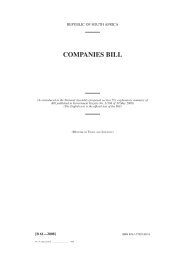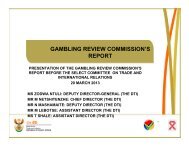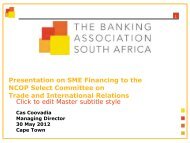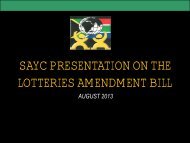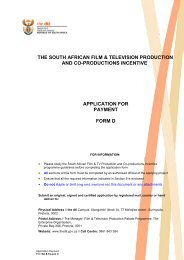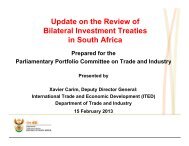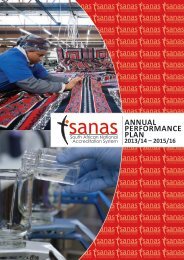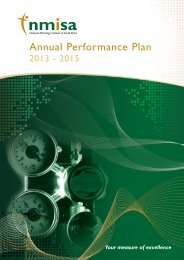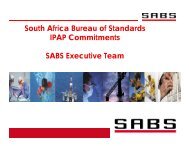Copyright Review Commission Report - ICT Law and Regulation ...
Copyright Review Commission Report - ICT Law and Regulation ...
Copyright Review Commission Report - ICT Law and Regulation ...
- No tags were found...
Create successful ePaper yourself
Turn your PDF publications into a flip-book with our unique Google optimized e-Paper software.
EXECUTIVE SUMMARYi. The <strong>Copyright</strong> <strong>Review</strong> <strong>Commission</strong> (CRC) conducted a detailed examination of the workings of collectingsocieties that were established in South Africa to license musical <strong>and</strong> literary works, sound recordings <strong>and</strong>published editions to prospective users, <strong>and</strong> to collect on behalf of the rights owners the royalties payable by theusers. It analysed their functioning <strong>and</strong> the degree to which they complied with the accepted principles ofcorporate governance. Societies set up to collect royalties payable for the broadcasting, transmission in adiffusion service or communication to the public of sound recordings (so-called 'needletime' royalties) areregulated by statute <strong>and</strong> the <strong>Commission</strong> considered the extent to which they complied with the regulationspromulgated under the <strong>Copyright</strong> Act, 1978.ii.A major focus of the CRC's work was to ascertain how it came about that, nine years after the enactment ofneedletime legislation in 2002, not a cent had been paid in royalties to musicians <strong>and</strong> record companies. Itconcluded that the legislation, which provided for a statutory licence in respect of needletime, did not adequatelyprotect the rights owners, whose rights were made subject to the licence. This made possible the delay ofpayment <strong>and</strong> led to the current situation where two cases before the <strong>Copyright</strong> Tribunal <strong>and</strong> another in the NorthGauteng High Court have to be decided before the musicians <strong>and</strong> record companies involved are able toreceive the money owing to them. The royalties in these cases amount to millions of r<strong>and</strong>. The CRC says itappears that those entitled to these royalties have not received payment because of what looks like a prolongedfilibuster designed to postpone the day when broadcasters will have to pay needletime. If that is the case, then itis unfortunate that the main beneficiary of this alleged filibuster is the national broadcaster. The CRC makesdetailed recommendations as to how the defects in the law that made this situation possible could be rectified. Italso recommends that the <strong>Copyright</strong> Tribunal be drastically recast to enable it to function expeditiously <strong>and</strong>efficiently. See Chapter 3, paragraphs 3.3.11 to 3.3.13.iii.Based on international trends <strong>and</strong> the problems experienced as a result of multiple collecting societies operatingwithin the same set of rights (e.g. the National Organisation for Reproduction Rights in Music (NORM) versusthe Southern African Music Rights Organisation (SAMRO) with regard to mechanical rights) the CRCrecommends that the legislation be amended to allow for only one collecting society per set of rights with regardto all music rights governed by the <strong>Copyright</strong> Act of 1978 (i.e. performance, needletime <strong>and</strong> mechanical rights).See Chapter 6, paragraph 6.3.4.iv.Currently, only needletime collecting societies are supervised by the Registrar. Considering the recent collapseof the South African Recording Rights Association Ltd (SARRAL) <strong>and</strong> the inadequate protection of its members,the CRC believes it appropriate to regulate all relevant music rights collecting societies (SAMRO <strong>and</strong> NORM).See Chapter 7, paragraph 7.4.2.1.v. The CRC believes that the provisions in the Collecting Society <strong>Regulation</strong>s for payment into an ‘escrow’ accountare unsatisfactory because: The money that users agree that they are liable to pay <strong>and</strong> subsequently deposit into such accounts,cannot be distributed until the dispute over the appropriate tariff is resolved; <strong>and</strong> If users have to pay the money dem<strong>and</strong>ed before being permitted to broadcast or otherwise communicatethe recordings to the public (an issue which is sub-judice), they may be obliged to pay unreasonably largesums of money into the account.- 3 -



